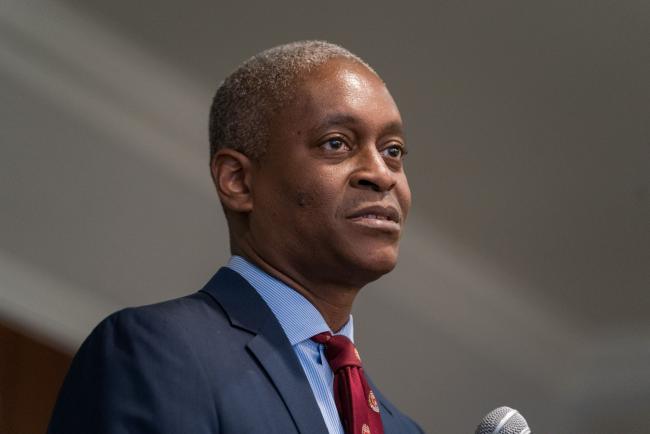(Bloomberg) -- Federal Reserve Bank of Atlanta President Raphael Bostic said he favored six quarter-point interest-rate hikes in 2022, a less aggressive approach than most of his fellow officials, in light of increased uncertainty about the outlook following Russia’s invasion of Ukraine.
“I penciled in six rate hikes for 2022 and two more for 2023,” Bostic said Monday in prepared remarks to a National Association for Business Economics conference in Washington. “I recognize that I am toward the bottom of the distribution relative to my colleagues, but the elevated levels of uncertainty are front forward in my mind and have tempered my confidence that an extremely aggressive rate path is appropriate today.”
Federal Open Market Committee policy makers led by Chair Jerome Powell voted 8-1 last week to raise interest rates by a quarter point for the first increase since 2018 as they confront the highest inflation in four decades. The move took the target range for their benchmark policy rate to 0.25% to 0.5%. St. Louis Fed President James Bullard’s dissent in favor of a half-point hike was the first vote against a decision since September 2020.
“Events are shifting rapidly, and we could see marked changes along key dimensions, such as aggregate demand, that could warrant quickly adjusting the trajectory of policy,” Bostic said.
The FOMC’s “dot plot” in its economic forecasts showed policy makers penciling in their expectation of rate hikes through each of the remaining six meetings in 2022, with the median projection for a quarter point every time. With almost half of policy makers seeking to go even faster, that would imply a half-point move at some time during the year.
“The risks go both ways,” Bostic said. “Should demand falter in the face of economic uncertainty or removal of monetary policy accommodation, then the appropriate path may be shallower than I currently project. But there are other developments, such as shifts in supply strategies, that could mean higher costs and thus motivate a steeper policy path than I expect.”
Bostic said he considered inflation as the top concern for policy makers this year and described the U.S. labor market as tight.
©2022 Bloomberg L.P.
